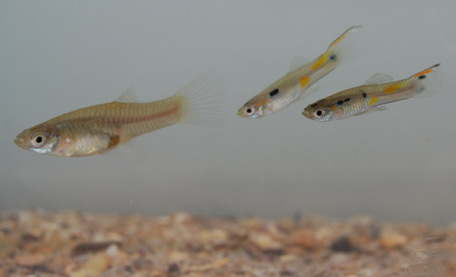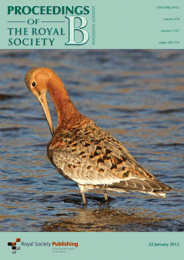
雌孔雀鱼通常会选择比自己“性感”的同性做“朋友”
科学家发现,当女性不想被不需要的男性注意时,她们往往会选择一个更有魅力的女伴。12月7日发表在《the journal Proceedings of the Royal Society B》上的这项研究第一次揭示了:女性与比自己更性感的同性朋友在一起,可以减小自己被异性骚扰的几率。
这项研究由埃克塞特大学和哥本哈根大学共同完成,研究对象是特立尼达岛的孔雀鱼(一种小型淡水鱼)。结果表明:雌孔雀鱼在“找朋友”时通常会选择比自己更“性感”的,这样就可以避免被雄孔雀鱼骚扰。事实证明,这是一个很成功的策略,雌孔雀鱼只要确保自己没有“姐妹团”的其它成员有魅力,那么它就可以如愿少受雄孔雀鱼的骚扰,从而减小自己交配的频率。
众所周知,雄孔雀鱼是出了名的“好色”,有时会不断地骚扰异性。这就给了雌孔雀鱼很大的负担,所以,它们有时候才会使出上述策略来脱身。
但是,雌孔雀鱼一个月也有那么几天是“开放”的。在此期间,它们会释放出一种性激素来吸引雄孔雀鱼,然后再“约到”一个地方进行交配。
这些孔雀鱼来自特立尼达岛阿里波河(Aripo River)。研究者们先将愿意暂时接受雄孔雀鱼注意的雌孔雀鱼(I)与那些不愿意的(II)区别开来,然后,他们统计了不愿意的与愿意的雌孔雀鱼与彼此在一起的时间。
研究者们发现,第II组会花相当长的时间与第I组在一起,这样它们就可以少被异性骚扰。
领头科学家、来自埃克塞特大学的Safi Darden说:“我们以前就知道,有些雌性物种会选择没它们有魅力的同性作朋友,以此来吸引异性注意。所以,我们想要弄清楚,雌性动物会不会选择比它们还要有吸引力的同性伙伴,以此来减少异性的骚扰。”
“我们的研究表明,社交结构能够影响自身的相对吸引力和交配策略。尽管我们只研究了一种鱼,但是我们相信,这种策略在其它不想引起雄性过度关注的雌性物种身上一定也可以看得到。”
推荐阅读:雄孔雀鱼橙斑50万年不变生物进化谜题

Social preferences based on sexual attractiveness: a female strategy to reduce male sexual attention
Josefine B. Brask, Darren P. Croft, Katharine Thompson, Torben Dabelsteen1 and Safi K. Darden
Male sexual harassment of females is common across sexually reproducing species and can result in fitness costs to females. We hypothesized that females can reduce unwanted male attention by constructing a social niche where their female associates are more sexually attractive than themselves, thus influencing the decision-making of males to their advantage. We tested this hypothesis in the Trinidadian guppy (Poecilia reticulata), a species with high levels of male sexual harassment. First, we confirmed that non-receptive females were harassed less when they were paired with a more sexually attractive (receptive) female than with another non-receptive female. We then found that, indeed, females exploit this as a strategy to reduce sexual harassment; non-receptive females actively preferred to associate with receptive over non-receptive females. Importantly, when given access only to chemosensory cues, non-receptive females still showed this preference, suggesting that they use information from chemical cues to assess the sexual attractiveness of potential female partners. Receptive females in contrast showed no such preferences. Our results demonstrate that females can decrease male harassment by associating with females that are more sexually attractive than themselves and that they perform active partner choices based on this relative attractiveness. We propose that this strategy is likely to represent an important pathway by which females can construct social niches that influence the decision-making of others to their advantage; in this case, to reduce the sexual harassment they experience.








